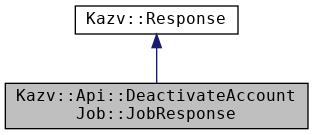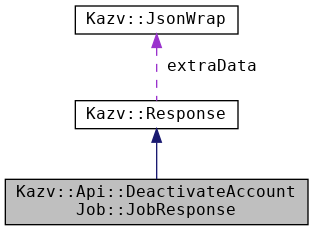Kazv::Api::DeactivateAccountJob::JobResponse Class Reference
#include <registration.hpp>
Inheritance diagram for Kazv::Api::DeactivateAccountJob::JobResponse:

Collaboration diagram for Kazv::Api::DeactivateAccountJob::JobResponse:

Public Member Functions | |
| JobResponse (Response r) | |
| bool | success () const |
| std::string | idServerUnbindResult () const |
| An indicator as to whether or not the homeserver was able to unbind the user's 3PIDs from the identity server(s). More... | |
 Public Member Functions inherited from Kazv::Response Public Member Functions inherited from Kazv::Response | |
| std::string | errorCode () const |
| std::string | errorMessage () const |
| JsonWrap | jsonBody () const |
| constexpr bool | success () const |
| json | dataJson (const std::string &key) const |
| std::string | dataStr (const std::string &key) const |
| std::string | jobId () const |
Additional Inherited Members | |
 Public Types inherited from Kazv::Response Public Types inherited from Kazv::Response | |
| using | StatusCode = int |
 Public Attributes inherited from Kazv::Response Public Attributes inherited from Kazv::Response | |
| StatusCode | statusCode |
| Body | body |
| Header | header |
| JsonWrap | extraData |
Constructor & Destructor Documentation
◆ JobResponse()
| Kazv::Api::DeactivateAccountJob::JobResponse::JobResponse | ( | Response | r | ) |
Member Function Documentation
◆ idServerUnbindResult()
| std::string Kazv::Api::DeactivateAccountResponse::idServerUnbindResult | ( | ) | const |
An indicator as to whether or not the homeserver was able to unbind the user's 3PIDs from the identity server(s).
success indicates that all identifiers have been unbound from the identity server while no-support indicates that one or more identifiers failed to unbind due to the identity server refusing the request or the homeserver being unable to determine an identity server to unbind from. This must be success if the homeserver has no identifiers to unbind for the user.
◆ success()
| bool Kazv::Api::DeactivateAccountResponse::success | ( | ) | const |
The documentation for this class was generated from the following files:
- src/api/csapi/registration.hpp
- src/api/csapi/registration.cpp